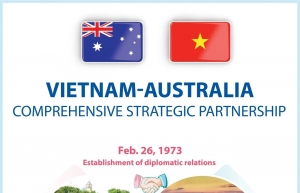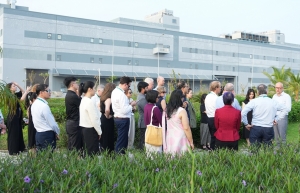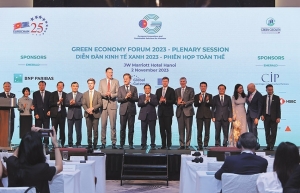Australia and Vietnam join forces to cultivate quality workforce for net-zero future
In September, Typhoon Yagi caused estimated economic losses of up to $3.3 billion in northern Vietnam, exceeding the past three years' natural disaster losses. GDP growth could drop by more than 0.15 per cent from the 6.8-7 per cent target set for this year.
This setback highlights the urgent need for Vietnam to adopt a new development approach, as the World Bank and International Monetary Fund warn that climate change could cost the nation billions of US dollars in growth annually.
As a developing nation grappling with challenges and opportunities in tackling climate change, Vietnam must balance economic growth with environmental sustainability. A low carbon economy is essential to the Green Growth Strategy's five pillars, supporting the country’s 2050 net-zero emissions goal.
Since COP26, Vietnam has made notable progress in sustainable energy, notably with the approval of Power Development Plan VIII (PDP8) for 2021-2030, which aims to increase the renewable energy share in power generation to 31-39 per cent by 2030 and 68-72 per cent by 2050.
Demand for skilled professionals in green energy
With targets relying on decarbonising the power sector, reducing coal-fired power generation, and accelerating the deployment of renewable energy, it proves important to reskill or upskill the current workforce in the power sector.
The International Renewable Energy Agency (IRENA) ranks Vietnam among the top 10 countries with the most dynamic renewable energy job markets, and over half of ASEAN’s new renewable energy jobs created in Vietnam, showcasing its strong job creation potential in this sector.
 |
| Job creations based on renewable energy type in 2025 - Source: ASEAN Centre for Energy |
In Vietnam, the energy transition is expected to require 1.61 to 1.93 million workers. Around 25 per cent of these jobs will be for highly skilled workers, particularly in wind and solar power.
Despite high demand and potential, workforce preparation in Vietnam’s renewable energy sector remains fragmented and lacks a long-term strategy.
Renewable energy jobs in Vietnam require expertise in power systems, but the workforce is predominantly low-skilled, leading to a shortage of engineers for key tasks like power plant construction and grid connection.
IRENA notes that current training programmes at universities, colleges, and vocational schools are insufficient for the sector's needs, with many engineers lacking renewable energy expertise.
To support sustainable growth, a comprehensive training strategy, including continuous education and international partnerships, is crucial to developing a skilled workforce for the country’s future industry demands.
Australian capabilities and experience
Vietnam and Australia celebrated 50 years of diplomatic relations last year, reinforcing their partnership through shared priorities like climate change.
Both countries view the green economy as a vital area for cooperation, with Australia’s ambition to lead in renewable energy aligning with Vietnam’s focus on wind and solar development.
Under their 2024 Comprehensive Strategic Partnership (CSP), Vietnam and Australia are set to deepen cooperation on skills development.
 |
| Professors and industry experts from Australia and Vietnam - Source: Austrade |
The Australian government continuously supports Vietnam to enhance the capacity of energy agencies and institutions.
Through the Mekong Australia Partnership and Partnerships for Infrastructure (P4I), many training courses have been delivered to National Assembly members, the Ministry of Natural Resources and Environment, Ministry of Finance, Minister of Industry and Trade’s energy agencies, National Power System and Market Operator, EVN, and diverse power corporations.
Other initiatives such as Australia's skills and training packages, including Aus4Skills, Aus4Growth, and Aus4Adaptation, also provide valuable frameworks for developing green skills in Vietnam.
| The Australian government continuously supports Vietnam to enhance the capacity of energy agencies and institutions. |
The Aus4Skills initiative has facilitated the studies and professional development of 6,000 Vietnamese leaders in Australia, enhancing Vietnam's access to high-level professional knowledge and skills.
Decarbonising Vietnam's economy requires reskilling and upskilling the workforce to meet the demands of emerging sectors.
Strengthening partnerships is crucial, given that Australian higher education and Vietnam’s education and training sectors have strong expertise and experience with industry linkages preparing for a green workforce.
Achieving net-zero goals requires a new engineering expertise that combines deep technical knowledge with broad interdisciplinary skills for complex, sustainable energy solutions.
In response, Curtin University has created a new engineering bachelor’s major aligned with Vietnam’s shift from coal to solar and wind technologies.
This programme aims to equip students with the necessary technical and cross-disciplinary skills to lead in the transition to a low-carbon future.
Other examples of advanced training solutions for new skills in emerging industries, include battery storage, biomass, waste-to-energy, and hydrogen; Australia also has training centres such as the Hydro and Renewable Energy Research Centre at Central Queensland University, the Future Energy Efficient Technologies Centre at RMIT, and specialised courses at University of Adelaide.
Australian universities have a strong focus on skills development and knowledge transfer. For example, RMIT, Swinburne University of Technology, and Monash University established joint programmes with Vietnamese institutions, fostering skills development through initiatives like Climateworks’ Southeast Asia Just Energy Transition Fellowship, which connects experts for knowledge transfer and capacity building.
Holmesglen Institute, originally focused on building and construction, is now one of Australia’s largest public providers, with seven campuses in Melbourne and specialised training across 43 industry sectors, including renewable energy, electricity supply, civil construction, and tunnelling.
By harnessing the power of education and training institutions, alongside strong industry and government collaboration, Australia and Vietnam can pave the way for innovative programmes that effectively bridge the skill gap and drive Vietnam’s transition towards clean energy forward.
 | Vietnam - Australia Comprehensive Strategic Partnership Established in 1973 and elevated to a Strategic Partnership in 2018, the relationship between Vietnam and Australia has experienced significant and comprehensive growth across all areas. During Prime Minister Pham Minh Chinh's official visit to Australia from March 7-9, the two nations further upgraded their relations to a Comprehensive Strategic Partnership. |
 | Australia and Vietnam foster education and training towards green economy An Australian education delegation is in Vietnam to take part in the Australia Southeast Asia Business Exchange (A-SEABX) Mission from September 25-27 in Hanoi and Haiphong, focusing on the transition to net zero and advancing green economy priorities. |
 | GEFE 2024 to catalyse a green future for Vietnam Driven by the success of previous events, businesses and investors are pinning high hopes on the Green Economy Forum & Exhibition 2024 to seek more opportunities to partner with Vietnam in its net-zero mission. |
What the stars mean:
★ Poor ★ ★ Promising ★★★ Good ★★★★ Very good ★★★★★ Exceptional
 Tag:
Tag:
Related Contents
Latest News
More News
- Agro-forestry and fisheries exports jump nearly 30 per cent in January (February 09, 2026 | 17:45)
- Canada trade minister to visit Vietnam and Singapore (February 09, 2026 | 17:37)
- New tax incentives to benefit startups and SMEs (February 09, 2026 | 17:27)
- Vietnam forest protection initiative launched (February 07, 2026 | 09:00)
- China buys $1.5bn of Vietnam farm produce in early 2026 (February 06, 2026 | 20:00)
- Vietnam-South Africa strategic partnership boosts business links (February 06, 2026 | 13:28)
- Mondelez Kinh Do renews the spirit of togetherness (February 06, 2026 | 09:35)
- Seafood exports rise in January (February 05, 2026 | 17:31)
- Accelerating digitalisation of air traffic services in Vietnam (February 05, 2026 | 17:30)
- Ekko raises $4.2 million to improve employee retention and financial wellbeing (February 05, 2026 | 17:28)


























 Mobile Version
Mobile Version